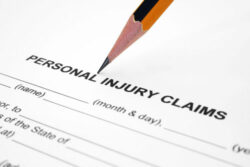Explanation of Interrogatories in Pennsylvania Injury Cases
Interrogatories are a critical step in a personal injury lawsuit. Having an experienced attorney by your side is essential to navigate this process effectively and protect your interests.
 When you are the plaintiff of a personal injury lawsuit, you will be asked to tell what caused your injuries, how the accident occurred, and several questions about personal details such as how much you earn, where you live, and with whom, among other topics. This aspect of the discovery phase of your lawsuit is referred to as interrogatories. A long list of questions is sent to you and your attorney, allowing the defendant to obtain as much information as possible to build their case. This is more than a simple question-and-answer exercise. You must provide your answers while under oath and answer all of the questions as truthfully as possible.
When you are the plaintiff of a personal injury lawsuit, you will be asked to tell what caused your injuries, how the accident occurred, and several questions about personal details such as how much you earn, where you live, and with whom, among other topics. This aspect of the discovery phase of your lawsuit is referred to as interrogatories. A long list of questions is sent to you and your attorney, allowing the defendant to obtain as much information as possible to build their case. This is more than a simple question-and-answer exercise. You must provide your answers while under oath and answer all of the questions as truthfully as possible.
A Breakdown of Interrogatories in Personal Injury Litigation
Why do Interrogatories Exist in Personal Injury Law?
The purpose of interrogatories is to gather as much information as possible about you, your accident, the damages you seek, and any other information the defense feels is pertinent to the case. Both sides use the questions as a way to strategize. If you and your attorney are aware of what you will be asked, it provides a rough map of where the defense will go. You will be given 30 days to answer the questions, and it is beneficial to do so in the presence of your attorney. Your attorney supports and guides you, helping you express yourself clearly and concisely. It is vital to be honest because the same questions could be asked in a deposition or court, and if your answers are inconsistent, you could be perceived as misleading and deceptive.
What Information can be Gleaned through Interrogatories?
For the purposes of discussing the types of questions you will be asked during interrogatories, let us familiarize ourselves with an example that can be applied to the types of interrogatories you will encounter. Let’s say the plaintiffs drove home after having a late dinner. When they reached a green light, they were T-boned by a car that had run the red light. In this scenario, they will be asked when the accident occurred, where they were, who was involved, and how it happened. Those seem simple enough questions, but they could be tricky when they get more specific.
Are you sure your light was green? Did you have time to stop and avoid the accident? Did you have wine with dinner? It was late, were you tired? What were the road conditions (rain, sleet, snow)? Does your car have any mechanical problems? Do you struggle to see at night? These kinds of questions can cast doubt on your driving skills, alertness, and whether the car accident could have been avoided. The defense is going to use your testimony to ensure their client wins.
Details about their injuries, how they were hurt, what medical treatment they received, and how their income was affected by their inability to work are also asked. One of the injured victims had a broken clavicle, a dislocated shoulder, and whiplash. The other got the worst of it because they were hit on the passenger side, where he was seated. Internal bleeding from a ruptured spleen, six broken ribs, a broken leg, and a fractured pelvis were his injuries.
One of the questions was if either had previous medical conditions that could affect the severity of their injuries. The first victim had broken her clavicle on the same side less than a year prior in a ski accident, and she injured her shoulder then as well. This information could take away from the severity of her injuries being caused by the accident alone. They will be asked what treatments they have received and how the accident continues to affect their mental, emotional, and physical health.
Questions will also be asked about witnesses, their contact information, and where they were at the time of the accident. Your insurance coverage will be another topic. They will want to know your coverage limits, who your carrier is, and any claims you have made through your insurance in the past. Lastly, they will ask about previous accidents or lawsuits you have participated in. They will want to know every detail, including what happened, who was at fault, and how it was resolved. They will want to see if you have ever participated in any other lawsuits or personal injury claims and ask you to provide circumstances and outcomes.
Rules, Procedures, and Scope Governing Interrogatories in Pennsylvania
Pennsylvania Rule 4005 requires interrogatories to be limited to the pertinent information regarding the suit. Interrogatories may be sent from the defendant to the plaintiff and vice versa. Their purpose is to narrow the trial’s focus to the accident and injury of the offended party. More than one set of questions can be sent, but the court can limit them to protect the party from “unreasonable annoyance, embarrassment, oppression, burden, or expense.”
Responding Effectively to Interrogatories Related to Your Personal Injury Case
 Because this is a legal document and you swear an oath of honesty, answer all the questions as truthfully and thoroughly as possible. Never attempt to submit your answers without your attorney’s involvement. They can object to irrelevant or improper questions and guide you in expressing yourself clearly and succinctly. Submitting the answers on time is of the utmost importance.
Because this is a legal document and you swear an oath of honesty, answer all the questions as truthfully and thoroughly as possible. Never attempt to submit your answers without your attorney’s involvement. They can object to irrelevant or improper questions and guide you in expressing yourself clearly and succinctly. Submitting the answers on time is of the utmost importance.
Trust Our Pennsylvania Legal Team to Guide You Through Interrogatory Responses and Protect Your Interests
Our personal injury attorneys at Cohen & Riechelson know how hard it can be when you are injured due to no fault of your own, and no one wants to take responsibility for your injuries. You shouldn’t be expected to pay exorbitant amounts for your medical care and lost wages. We will protect your rights and seek compensation for your pain. We will raise objections to questions that are intrusive or irrelevant.
We have 50 years of experience helping clients with seeking compensation for their injuries in Buckingham, Morrisville, Bensalem, Warminster, Levittown, Northeast Philadelphia, and throughout Pennsylvania. Our attorneys have successfully won many of our clients’ personal injury claims, in part because we support them as they complete the answers to interrogatories. We won’t tell you what to say, but when you have been in an accident, sometimes emotions take over, and it is hard to put your experience into words. We can guide you as you answer the questions as truthfully and concisely as possible. We will create a timeline to guarantee compliance with state deadlines. If you need help with a personal injury case anywhere in Pennsylvania, we are here to answer your questions. Call us at (215) 337-4915 or complete this short contact form to receive a free consultation.
